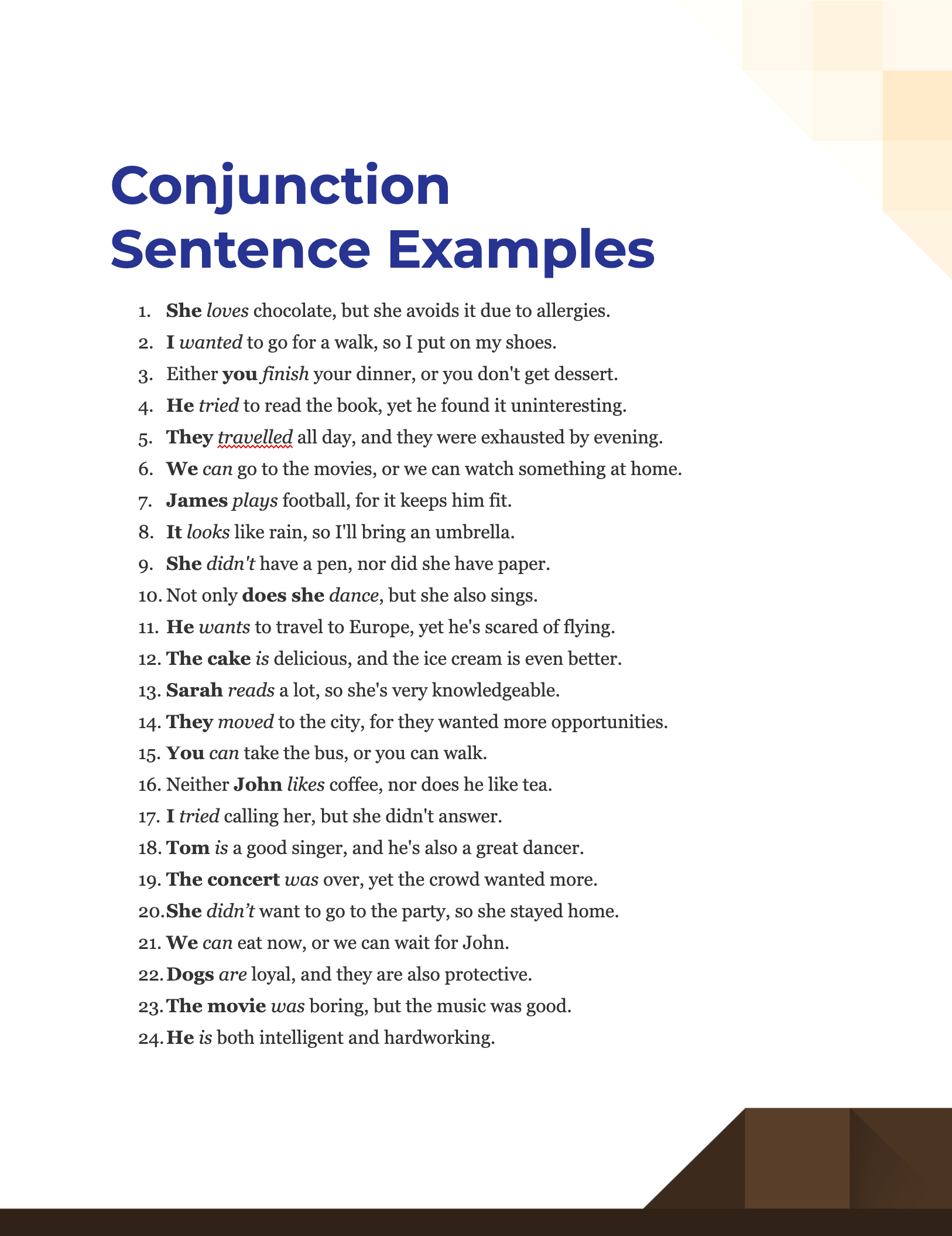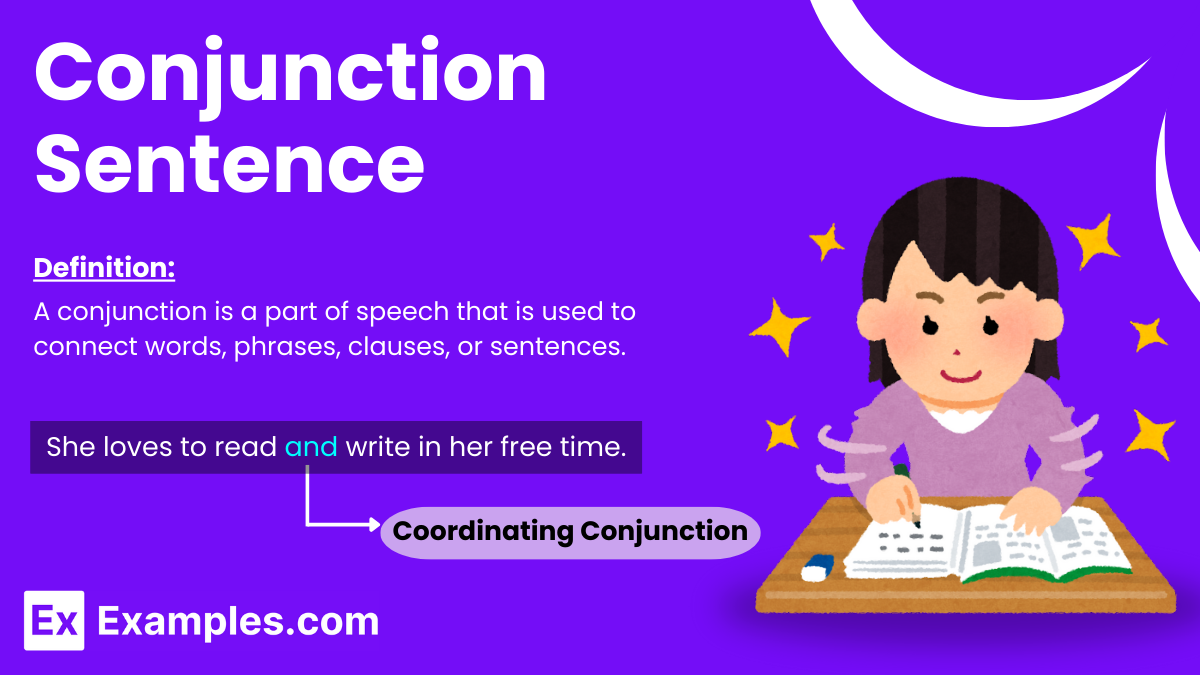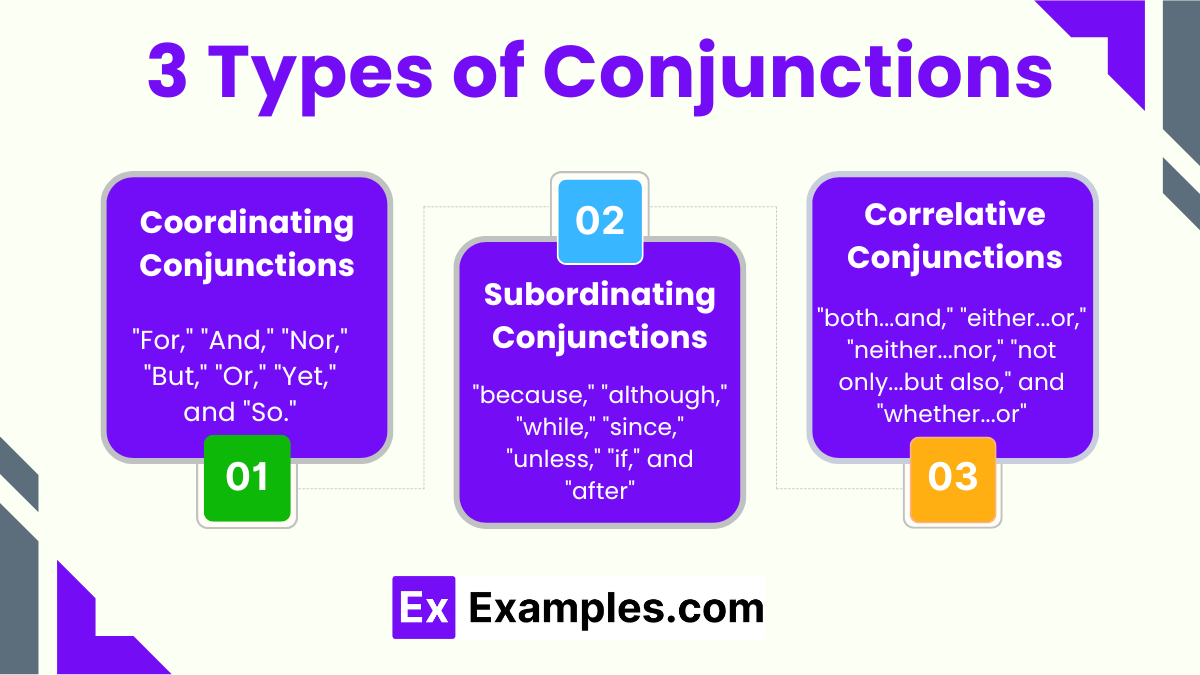100+ Conjunction Sentence Examples
Conjunctions are the unsung heroes of expressive writing, bridging ideas and weaving thoughts seamlessly. By understanding how to utilize them effectively, you can elevate the fluency and clarity of your sentences. Dive into our comprehensive guide on conjunction sentence examples, and discover the art of crafting harmonious and cohesive statements that resonate.
A conjunction is a part of speech that is used to connect words, phrases, clauses, or sentences. Conjunctions serve to coordinate or link different parts of a sentence to help express relationships, contrast, choice, cause, or condition. They are essential for creating complex sentences, adding variety to writing, and clarifying relationships between ideas. Common conjunctions include “and,” “but,” “or,” “yet,” “for,” “nor,” “so,” and “because.”
Conjunctions are categorized into three main types, each serving a distinct function in linking words, phrases, or clauses within sentences. Here are the types of conjunctions:
1. Coordinating Conjunctions
Coordinating conjunctions connect elements of equal grammatical value, such as two independent clauses, words, or phrases. They are often remembered by the acronym FANBOYS, which stands for “For,” “And,” “Nor,” “But,” “Or,” “Yet,” and “So.” These conjunctions are used to add information, contrast ideas, present alternatives, or indicate a cause-effect relationship.
2. Subordinating Conjunctions
Subordinating conjunctions are used to join an independent clause with a dependent (or subordinate) clause, introducing a relationship like time, cause and effect, condition, or contrast between them. Examples include “because,” “although,” “while,” “since,” “unless,” “if,” and “after.” The dependent clause cannot stand alone as a sentence, and the subordinating conjunction provides the necessary link to the main clause, indicating its role or significance.
3. Correlative Conjunctions
Correlative conjunctions work in pairs to connect equivalent elements together. These conjunctions are used to balance sentences, showing relationships between matched elements. Examples of correlative conjunctions include “both…and,” “either…or,” “neither…nor,” “not only…but also,” and “whether…or.” They add emphasis and a sense of completeness to the connections they make within sentences.
How do you write Conjunction Sentences? – Step by Step Guide
Conjunctions serve as essential connectors in English, tying together various elements of a sentence for a seamless narrative. Understanding how to correctly use them can amplify your writing significantly. Here’s a step-by-step guide to writing conjunction sentences:
- Identify the Purpose:
- Decide why you are using a conjunction. Do you want to combine two similar ideas, express contrast, show cause and effect, or offer a choice?
- Choose the Right Type of Conjunction:
- Coordinating: Use when connecting similar ideas or items in a list.
- Subordinating: Implement when one idea depends on another.
- Correlative: Use in pairs to relate similar ideas.
- Conjunctive Adverbs: Use to provide additional details or emphasis.
- Positioning:
- For coordinating conjunctions, place them between the words or clauses you’re connecting.
- For subordinating conjunctions, place them at the beginning of the dependent clause.
- Correlative conjunctions always work in pairs, so ensure they are positioned correctly in relation to each other.
- Ensure Logical Consistency:
- The ideas you’re connecting should be logically consistent. For instance, using “because” necessitates a clear cause and effect in the linked ideas.
- Avoid Overuse:
- While conjunctions are helpful, using too many can make your sentence cluttered and confusing. Strike a balance.
- Check Punctuation:
- When connecting two independent clauses with a coordinating conjunction, use a comma before the conjunction. E.g., “I wanted to go swimming, but it was too cold.”
- For complex sentences using subordinating conjunctions, if the dependent clause comes first, use a comma to separate the clauses.
- Practice:
- Like any other writing skill, practice makes perfect. Regularly writing and revising your conjunction sentences will solidify your grasp.
General Rules for Using Conjunctions
- Avoid Comma Splices: Do not use a conjunction to join two independent clauses without a comma.
- Incorrect: I went home I was tired.
- Correct: I went home because I was tired.
- Parallel Structure: When using conjunctions, especially correlative ones, make sure the elements they connect are parallel in structure.
- Correct: She is interested in neither science nor arts.
- Avoid Double Conjunctions: Do not use two conjunctions together unless they are part of a correlative pair.
- Incorrect: But yet, he decided to stay.
- Correct: Yet, he decided to stay.
10+ Examples of Conjunction Sentence
- Coordinating Conjunction: “and”
- She loves to read and write in her free time.
- Coordinating Conjunction: “but”
- He wanted to go to the concert, but the tickets were sold out.
- Coordinating Conjunction: “or”
- Would you like tea or coffee with your breakfast?
- Coordinating Conjunction: “so”
- It started to rain, so we decided to stay indoors.
- Subordinating Conjunction: “because”
- We cancelled our trip because of the storm warning.
- Subordinating Conjunction: “although”
- Although it was cold outside, she went for a run.
- Subordinating Conjunction: “since”
- Since we have some time, let’s catch up over coffee.
- Subordinating Conjunction: “while”
- While I prefer classical music, my brother is a fan of rock.
- Correlative Conjunctions: “either…or”
- You can choose either the blue shirt or the red shirt for the party.
- Correlative Conjunctions: “not only…but also”
- The museum is not only famous for its ancient artifacts but also for its modern art collections.
Conjunctions are essential components of English grammar, serving as the connectors between words, phrases, clauses, or sentences. They help structure sentences and add coherence to the written and spoken word. Understanding how conjunctions work is fundamental to mastering the language. Here’s a breakdown of their functionality:
Connecting Words
At the simplest level, conjunctions can connect two or more words in a list or sequence.
- Example: “She bought apples, oranges, and bananas.”
- The conjunction “and” connects the words “apples,” “oranges,” and “bananas,” which are items in a list.
Linking Phrases
Conjunctions also link two or more phrases, providing a smoother flow of ideas.
- Example: “He sings in the choir and plays in the band.”
- Here, “and” connects two phrases, “sings in the choir” and “plays in the band.”
What is the best Example of a Conjunction Sentence?
One of the classic examples of a conjunction sentence is: “I wanted to buy a book, but I didn’t have enough money.” Here, the conjunction “but” is used to contrast two different ideas or situations, highlighting a certain conflict or juxtaposition between the desire to purchase a book and the lack of funds to do so.
100+ Conjunction Sentence Examples

Conjunctions act as connectors in sentences, ensuring a harmonious flow between thoughts. By skillfully incorporating conjunctions, writers can convey complex ideas with clarity and finesse. To help you grasp the full spectrum of conjunction usage, we’ve curated 100 exemplary conjunction sentences, emphasizing both subjects and verbs for clear differentiation.
- She loves chocolate, but she avoids it due to allergies.
- I wanted to go for a walk, so I put on my shoes.
- Either you finish your dinner, or you don’t get dessert.
- He tried to read the book, yet he found it uninteresting.
- They travelled all day, and they were exhausted by evening.
- We can go to the movies, or we can watch something at home.
- James plays football, for it keeps him fit.
- It looks like rain, so I’ll bring an umbrella.
- She didn’t have a pen, nor did she have paper.
- Not only does she dance, but she also sings.
- He wants to travel to Europe, yet he’s scared of flying.
- The cake is delicious, and the ice cream is even better.
- Sarah reads a lot, so she’s very knowledgeable.
- They moved to the city, for they wanted more opportunities.
- You can take the bus, or you can walk.
- Neither John likes coffee, nor does he like tea.
- I tried calling her, but she didn’t answer.
- Tom is a good singer, and he’s also a great dancer.
- The concert was over, yet the crowd wanted more.
- She didn’t want to go to the party, so she stayed home.
- We can eat now, or we can wait for John.
- Dogs are loyal, and they are also protective.
- The movie was boring, but the music was good.
- He is both intelligent and hardworking.
- Mary loves tea, yet she drinks coffee every morning.
- You should wear a jacket, for it’s cold outside.
- The flight was delayed, so we missed our connection.
- They didn’t like the first movie, nor did they like the second one.
- Lisa plays the guitar, and she also sings.
- He wants to buy a car, but he doesn’t have enough money.
- Birds fly, and fish swim.
- I would come, but I’m too busy.
- She bought a dress, for she needed it for the party.
- Jack reads a lot, so he knows many things.
- The cake tasted delicious, and it looked beautiful too.
- We could go to the beach, or we could visit the museum.
- She doesn’t like dancing, yet she loves music.
- The test was hard, but I passed.
- You can either stay here, or come with me.
- Not only did she write the article, but she also took the photos.
- They will visit the museum, for they love art.
- You need to study, or you will fail.
- He cooked dinner, and she washed the dishes.
- I called him, yet he didn’t answer.
- It can be here, or it can be there.
- We played football, and later we watched a movie.
- He isn’t tall, nor is he short.
- The sun sets, and the moon rises.
- She wanted to travel, but she was scared.
- I would go out, but it’s raining.
- Cats are independent, yet they can be affectionate.
- They are both kind and generous.
- He didn’t come to the party, nor did he call.
- The meal was delicious, and the service was excellent.
- John runs every day, for he wants to stay fit.
- You must finish this, or you will regret it.
- We went to the park, but it started raining.
- The book was interesting, and it was also very informative.
- She dances well, yet she’s shy to perform.
- They travelled by train, for it was faster.
- The show was boring, so we left early.
- I like coffee, and I also like tea.
- He studies hard, so he gets good grades.
- The movie started, and everyone went silent.
- She doesn’t like chocolate, nor does she like candy.
- They played all day, and they were tired at night.
- I would help, but I’m not available.
- Cats hunt, and dogs guard.
- She is neither tall nor short.
- We can go swimming, or we can just sunbathe.
- He wrote a letter, and he also sent an email.
- The city is crowded, yet it’s very lively.
- You must choose, for time is running out.
- The journey was long, but it was worth it.
- He is either with John or with Peter.
- The soup was hot, and it was also spicy.
- They don’t watch TV, nor do they use smartphones.
- She works hard, so she earns well.
- We tried to reach him, yet he was unavailable.
- The flowers are pretty, and they smell good too.
- I want to read, but I don’t have a book.
- The cake is either chocolate or vanilla.
- He can play the guitar, and he can also sing.
- The class was boring, so I doodled.
- They went skiing, for they love snow.
- I read the book, yet I didn’t understand it.
- The hotel was expensive, but it was luxurious.
- She wants to go out, yet she’s too tired.
- Birds sing, and bees buzz.
- I can either cook or order food.
- He doesn’t drink tea, nor does he drink coffee.
- The music was loud, and everyone was dancing.
- She is both smart and beautiful.
- We can watch a movie, or we can play games.
- I love pizza, and I also love pasta.
- They travelled to Europe, for they wanted an adventure.
- He plays football, yet he’s never injured.
- The play was interesting, so we watched it twice.
- The car is either blue or green.
- She reads books, and she also writes them.
These sentences are designed to showcase a variety of conjunctions and their potential usage in constructing diverse statements.
What is a Conjunction Example Sentence for Kids?
Introducing conjunctions to kids? Let’s simplify! Conjunctions are like bridges or glue sticks that help stick our ideas together in sentences. For kids, it’s best to use relatable and straightforward examples:
- I like apples and bananas. (Here, “and” is joining two things I like.)
- I wanted to play outside, but it started raining. (Here, “but” tells us there’s a problem or change.)
- You can have ice cream or cookies. (Here, “or” gives a choice.)
- I was sleepy because I stayed up late. (Here, “because” gives a reason.)
Remember, kids, the next time you want to join your ideas or things you like, use a conjunction! They’re like magic words that help your sentences come together.
Tips for Using Conjunction Sentences
- Vary Your Conjunctions: Don’t lean too heavily on one conjunction. Rotate through “and,” “but,” “or,” “so,” and others to add variety to your writing.
- Stay Context Relevant: Make sure the conjunction you use aligns with the context of your sentence. For instance, “yet” implies contrast, while “for” provides reasoning.
- Maintain Parallel Structure: Ensure that the elements you’re connecting with conjunctions are parallel in structure. E.g., “She likes reading novels and watching films.”
- Avoid Double Conjunctions: It’s generally not recommended to use two conjunctions together (e.g., “because since”). One is usually enough.
- Don’t Start Sentences with Coordinating Conjunctions (in formal writing): While it’s common in informal writing or dialogues, try to avoid starting sentences with “and,” “but,” or “so” in formal contexts.
- Clarify Ambiguity: Ensure that your use of conjunctions doesn’t make the sentence ambiguous. Be clear in conveying the relationship between the clauses or items you’re connecting.
- Practice with Complex Sentences: Challenge yourself by using conjunctions to create more complex sentences. This not only improves your grasp of conjunctions but also enhances your overall sentence construction skills.
FAQs
What is a Conjunction Sentence for Kids?
A conjunction sentence for kids uses simple connecting words like “and,” “but,” or “or” to join ideas or parts of a sentence, making sentences longer and more interesting.
What is an Example of a Conjunction for Kids?
An example of a conjunction for kids is: “I like apples and bananas.” Here, “and” connects two favorite fruits, apples and bananas.
What is Conjunction Class 8 with Examples?
In class 8, a conjunction connects clauses or sentences. For example, “Although it rained, we still went for a hike.” Here, “although” shows contrast between two ideas.
What is Conjunction in English 10?
For English 10, a conjunction is a word that joins sentences, clauses, or words, often to show a complex relationship. Examples include “because,” “however,” and “therefore.”
What are 5 Sentences Using the Conjunction But?
- I wanted to go out, but it was too cold.
- She loves coffee, but she drinks tea in the morning.
- He studies hard, but he also makes time for sports.
- The cake looked delicious, but it was too sweet.
- I tried to call you, but there was no answer.
Remember, conjunctions are more than just simple connectors; they add depth, clarity, and fluidity to your writing. With practice and attention to detail, you’ll be a pro at using them in no time!



